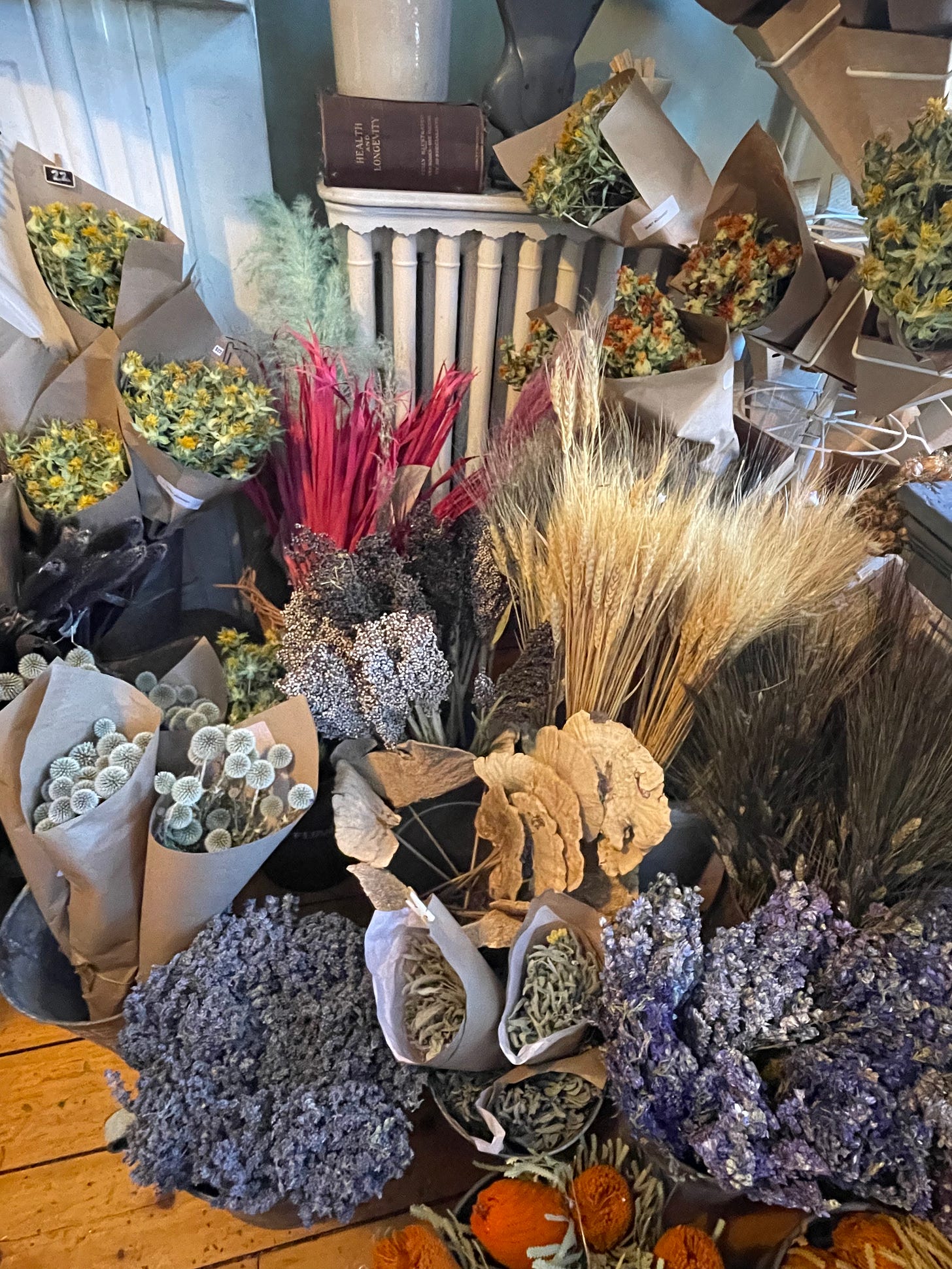Issue #83: How to help a friend through grief
The things we wish we'd known sooner.
It’s here: the “calm” before the new year. (Or if you have young kids: festive chaos.) For the next few Thursdays, we’re unlocking some of our most popular paid posts from the archives — starting with an updated guide to helping a friend through grief, from people who actually have.
The holidays are often harder for anyone who has faced loss — the disconnect from how they feel and how the world is acting and the near-constant reminders of what’s been lost — and we hope this advice makes you feel a little more equipped.
Written by Aliza Sir. Edited by Aja Frost.
Nearly three years ago, my best friend Margie lost her sister-in-law — an exceedingly special person — to glioblastoma. I’m proud of some of the ways I showed up during that time (flying home for the funeral, calling regularly, and organizing friends to check in). There are other moments and conversations where I fell short, and when I remember them now, still spark sadness and shame. But I try to give myself grace — because I was muddling my way through the process (and frankly, still am).
Here’s what we — and our friends and fellow Substack writers — learned about how to help a friend through grief.
1. “Walk to a wedding, run to a funeral.”
It's easy — instinctual, even — to run quickly towards joy. It’s much harder to sprint towards someone’s suffering. But that’s exactly why you should.
Our friend Diana, who lost her brother when she was younger, shared “walk to a wedding, run to a funeral” with us as a reminder to get to your friend’s side quickly, whether you’re calling or seeing them in person.

2. Listen and validate — don’t try to solve.
This was, by far, the most consistent recommendation we heard. amelia wilson, author of popular Substack Some Happy Scribbles, says, “Don’t minimize your friend’s feelings or give unsolicited advice. When someone close to me is struggling, my first impulse is to locate a solution to their problem: something I can do or say to make it go away as quickly as possible.”
This is both for her sake and theirs, she explains. It’s excruciating to witness someone you love in pain.
It's easy — instinctual, even — to run quickly towards joy. It's much harder to sprint towards someone's suffering. But that's exactly when our friends need us the most.
But here’s why listening is so important:
“One of the most difficult times of my life was the four-year period between my daughter’s complicated birth, which left me infertile, and the adoption of my son. When well-meaning friends and acquaintances offered happy-ever-after stories about their pregnancy struggles and reassured me that I was lucky to have one child, I felt intensely lonely. Aside from my doctors and husband, no one understood what was going on inside my body and I did not have the words to explain that I loved my daughter, and I was grieving the loss of my fertility and the future children I had imagined bearing.
I most appreciated the friends who listened as I talked about my feelings, without offering hopeful solutions or advice. Simple words, like: ‘This just sucks. I wish I could make it go away. I'm here for you,’ were the things I most needed to hear.”
Mikala Jamison writes the newsletter Body Type. She shared similar wisdom: “The writer Summer Brennan recently posted, ‘All unsolicited advice is criticism.’ That hit hard for me. When a friend is struggling, I like to think I’m being action or solutions-oriented, but they just need to feel seen and heard and comforted.”
Rather than saying, “It’s all going to be okay/look at the silver lining/you’ll look back at this one day and laugh,” say things like, “I’m so sorry you’re going through this. It sucks,” and “This must feel so hard and unfair.”
3. You’re close enough.
At times, I’ve found myself falling into the “Am I even close enough to… go to their mother’s funeral/send a note/bring over a meal?” trap. If you’re asking this question, the answer is yes — you’re “close enough.”
I’ve never regretted showing up for or reaching out to someone, as awkward as it may have felt in the moment. It’s the times I did nothing that I wish I could do over. As much as your friend may be surrounded by people showing up for them (many technically “closer” friends), your presence matters.
“I still remember every friend who reached out to me when Tallu was diagnosed,” Margie says. “I also remember the friends who didn’t — and I know it was not intentional, but it’s hard to move past that.”
4. Check in (and keep checking in.)
When asked how friends can best show up in these moments, our friend, Lacey, had a simple response: “Occasional calls or texts,” she says.
Another reader, Julia, lost her mom when she was 28. She’d want to hear: “No need to respond but thinking of you.” “No need to respond” is such a helpful phrase — it removes all expectations.

Aja offers another tip: Set a reminder for specific dates that might be tough (the anniversary of the day they lost someone, certain holidays, etc.) so you can send a loving note or give them a call. These moments, long after the initial loss — and when the rush to surround the person having a tough time has passed — are often when your friend needs to hear from you the most.
5. Make spending time together easy.
Your friend might be struggling, but that doesn’t mean there’s no space for joy. “Plan fun things your friend can join without any work or expectations on their end,” says my friend Marie, a mom of two who lost her dad shortly after her first child’s birth.
That might look like swinging by your friend’s place with ice cream sundae ingredients, asking if they want to take a long walk, or doing all the legwork for a night out (dinner reservations, movie tickets, etc.) — anything your friend will enjoy that you can plan without effort on their end.
5. Make (some) assumptions.
Aja and I have both, at various points, asked friends dealing with tough times, “What do you need?” Although well-intentioned, this question puts the onus back on the friend to figure out how you can help.
These days, we make assumptions about what our friend could need. There are classics for a reason: a home-cooked meal, restaurant gift card, or hand-written card.
“After Tallu’s death, a group of friends sent me a Postmates gift card. I didn’t realize it at the time, but there was no way I was going to be able to cook for myself,” Margie says. “That small gift felt like such an act of reassurance, an ‘I got you.’”
I’ll always remember when my friend Justine showed up shortly after Jude’s birth with several Tupperware containers of baked pasta shells. And, not long after my miscarriage, when my friend Charlotte mailed a thoughtful note and gift card for my beloved local bookstore.
6. Talk about the elephant.
It will be almost three years this February since Tallu died. After the funeral, a group of us gathered at Margie’s house to eat Indian food and talk — and cry — about Tallu.
This moment is now memorialized in a picture on Margie’s fridge and always makes me think: What do we lose when we shy away from saying someone’s name? Of naming the thing?
“I want my friends to address it,” my cousin, Lily, says. “No need to dance around the topic.” That might mean that you sometimes say the wrong thing — but that’s okay. (Seriously.)
“As I navigated death, divorce, and a layoff, the people who always knew the right thing to do and say were — you guessed it! — people who’d been through the exact same things,” Maddie writes. “That said, it was equally touching to hear from people who didn’t know what to do, but tried their best anyway.”
After carefully dodging the topic of babies and pregnancy and infertility at work events and holiday parties the past several weeks, when I sat down at a recent brunch with two of my closest friends from high school and they asked, “So, how are you…really?” it felt like a warm embrace.
What’s your advice for showing up for friends during times of grief — especially during the holidays? We’d love to hear from you.
If you enjoy reading Platonic Love, there are a few ways to let us know: “like” this post, leave a comment, buy us a coffee, or upgrade to a Paid subscription. We read and appreciate every single comment, mention, and subscriber note. Thank you for being here, and happy holidays!









Best article I’ve read on supporting someone who’s grieving in a long time 💛 thank you!
Loved this! Adding to #2: Don’t try to cheer them up or (unless you are an expert) question the current medical assessment. I am currently pregnant with twins and we were told one might not survive. „But at least the other one is doing well“ - I just don’t know what to say to that, of course I am super grateful AND I already love both of them. Ask questions instead of making assumptions- e.g. our realistic best case scenario entails (at least) 2 months of Nicu - if you think the other person might be „too upset“ about those news, because your cousin‘s daughter was a couple of days in Nicu as well and she turned out fine - ask for additional information. And it‘s okay to ask and say the „wrong“ thing - we are all lesrning.
last point- if you can’t show up because you have currently too much on your own plate- that’s fine too, tell them exactly that